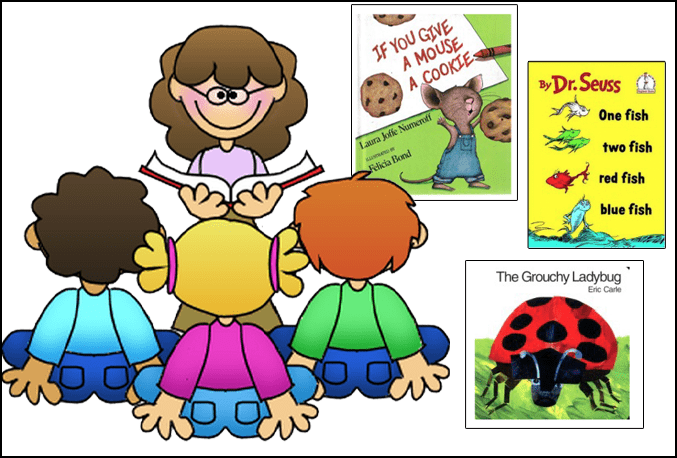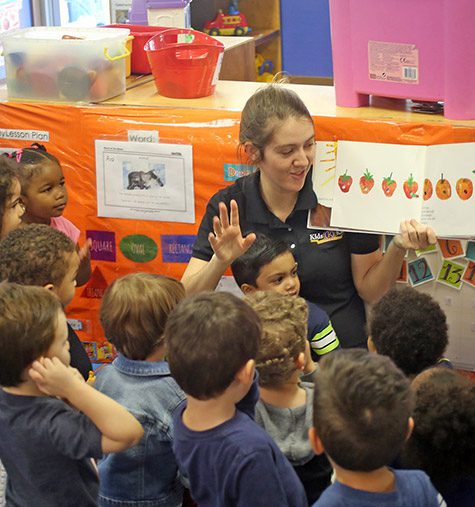Jan 13th-17th is Literacy Week! Our teachers will be reading many different books to impact the children at Kids R Kids Avalon Park in the best way.
Forming new habits is a challenge for all of us. According to habit expert Gretchen Ruben, there are at least 21 different strategies for habit change. This is a great time of year to use one of these strategies to make reading time with your child a habit if it isn’t already! The time you spend now reading with your toddler or preschooler can impact the rest of their lives.

There are few activities or routines that have more of a lasting impact than reading. The American Academy of Pediatrics has even recommended that pediatricians prescribe reading to parents during well-child visits. Reading exercises kids’ brains in a way that television doesn’t. It improves their cognitive development and teaches them everything from sentence structure and language comprehension to empathy and discipline. Toddlers and preschoolers are especially impacted by reading.
Let’s dive deeper into the impact of reading for toddlers and preschoolers.
Reading Promotes Cognitive Development
Problem-solving, decision making, and memory are all aspects of cognitive function. As children develop from infants to toddlers, you can see their cognitive development in the process. It is on display when they start to assert and test the boundaries of their independence. Like when they pick out their outfits or try to put their clothes on by themselves. Reading to children strengthens their cognitive development. It helps them to better understand what is happening around them, develop reasoning skills, and process the information you share with them.
Research even shows that reading creates and strengthens pathways in their brains. In the last 1990s, researchers began using brain imaging technologies to study the impact of reading on children. They discovered that, when a childcare provider reads to a toddler, thousands of cells in the child’s brain respond within a matter of seconds. “Some brain cells are ‘turned on,’ triggered by this particular experience. Many existing connections among brain cells are strengthened. At the same time, new brain cells are formed, adding a bit more definition and complexity to the intricate circuitry that will remain largely in place for the rest of these children’s lives.”
Reading Teaches Discipline and Concentration
Getting toddlers and preschoolers to sit still is challenging! Reading helps them learn discipline and concentration. Once they begin actively listening to you, they settle in and focus. Allowing them to turn the page or ask you questions, keeps them engaged. This process helps them form the self-disciple they will need to concentrate on homework and projects in the future. It also lengthens their attention span and memory retention.
The consistency of daily reading is important for them to glean the benefits of improved concentration and discipline.
Reading Improves Language Skills

Our language skills allow us to understand each other and communicate our own needs and desires. Difficult development stages like “the terrible twos” are often triggered in part by children’s frustration at their inability to adequately express themselves and be understood. Reading with your child frequently helps them to develop these language skills that prepare them to have healthy relationships. Developing strong language skills at a young age also paves the way for success in school.
There are five essential reading and language skills that children acquire at an early age according to the University of Michigan’s Parenting Resources.
- “Phonemic awareness – Being able to hear, identify, and play with individual sounds in spoken words.“
- “Phonics – Being able to connect the letters of written language with the sounds of spoken language.“
- “Vocabulary – The words kids need to know to communicate effectively.“
- “Reading comprehension – Being able to understand and get meaning from what has been read.“
- “Fluency (oral reading) – Being able to read text accurately and quickly.”
Study after study has confirmed that reading to toddlers and preschoolers help them master these skills at younger ages. Children who enter school with higher language skills are more likely to excel throughout their entire school career.
The value of reading to your kids is wide-ranging! The most effective strategy for parents and caregivers to make daily reading time a habit is to incorporate it into your morning or bedtime routine. But you don’t have to carry the burden all by yourself! Choosing a childcare or preschool, like Kids R Kids Avalon Park, where reading is a central part of the curriculum will also have a big impact on your child. Sometimes children who show little interest in reading get interested in it when they are surrounded by their peers. Sending your child to a childcare or preschool that has daily reading time will amplify the impact of your reading time at home.
If you’d like to learn more about Kids R Kids’ educational philosophy, contact us to plan your visit!